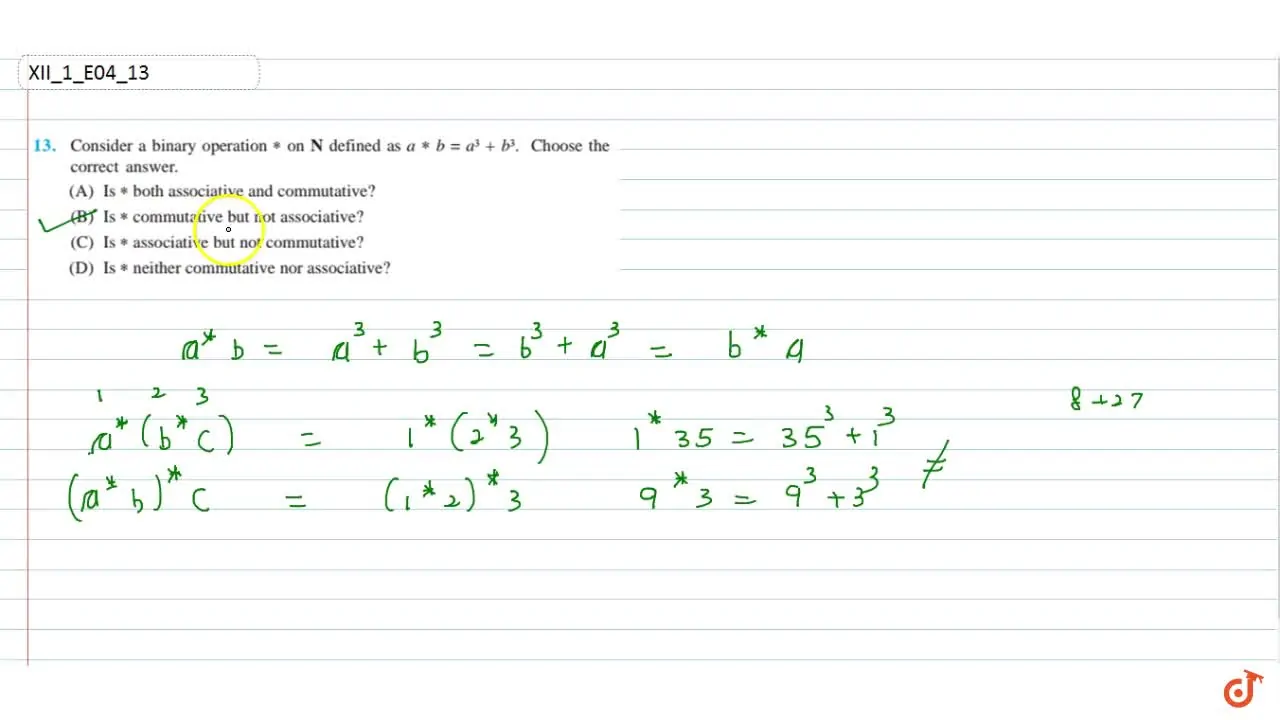Consider a binary operation. on N defined a∗b=a3+b3. Choose the correct answer.
(A) Is ∗ both associative and commutative?
(B) Is ∗ commutative but not associative?
(C) Is ∗ associative but not commutative?
(D) Is ∗ neither commutative nor associative?
The correct Answer is:(B) Is ∗ commutative but not associative?
It is given that the binary operation ∗ on N is defined as
a∗b=a3+b3
Apply the given binary operation on b∗a.
b∗a=b3+a3
=a3+b3
It shows that the value of a∗b is equal to that of b∗a. So, the operation is commutative.
Consider different values of the variable as a=1,b=2 and c=3.
Apply the given binary operation on (a∗b)∗c.
(a∗b)∗c=(1∗2)∗3
=(13+23)∗3
=93+33=756
Apply the given binary operation on a∗(b∗c).
(a∗b)∗c=1∗(2∗3)
=1∗(23+33)
=13+353
=42876
As the value obtained by (a∗b)∗c and a∗(b∗c) is different, so the operation is not associative.
This shows that the given operation is commutative, but not associative.
Thus, the correct option is option (B).
Related Playlists
- BOOK - NCERTCHAPTER - RELATIONS AND FUNCTIONSEXERCISE - EXERCISE 1.212videos
RELATIONS AND FUNCTIONS
- BOOK - NCERTCHAPTER - RELATIONS AND FUNCTIONSEXERCISE - Exercise 1.116videos
RELATIONS AND FUNCTIONS
- BOOK - NCERTCHAPTER - RELATIONS AND FUNCTIONSEXERCISE - SOLVED EXAMPLES50videos
RELATIONS AND FUNCTIONS
- BOOK - NCERTCHAPTER - PROBABILITYEXERCISE - EXERCISE 13.218videos
PROBABILITY
- BOOK - NCERTCHAPTER - SETSEXERCISE - EXERCISE 1.31videos
SETS
Similar Questions
Define a binary operation on a set.
View SolutionConsider a binary operation '∗' on N defined as : a∗b=a3+b3. Then :
View SolutionConsider the binary operation on Z defined by a⋅b=a−b. Then ⋅ is
View SolutionIf a binary operation is defined by a∗b=ab then 4∗2 is equal to:
View SolutionIf a binary operation is defined by a∗b=ab, then 3∗2 is equal to :
View SolutionLet * be a binary operation on N defined by a*b = ab for all a,b ∈ N show that * is neither commutative nor associative
View SolutionLet *beab∈aryoperationdef∈edbya^{*} b=2 a+b-3.F∈d3^{*} 4.
View SolutionLet '∗' be a binary operation on Q defined by :
a∗b=2ab3.
Show that '∗' is commutative as well as associative.View SolutionIf * is a binary operation in N defined as a*b=a3+b3 , then which of the following is true :
(i) * is associative as well as commutative.
(ii) * is commutative but not associative
(iii) * is associative but not commutative
(iv) * is neither associative not commutative.View SolutionLet * be the binary operation on N defined by a⋅b=HCF of a and b . Does there exist identity for this binary operation on N ?
View Solution


